The Waiting Game
m |
m (Waiting Game moved to The Waiting Game) |
Revision as of 12:21, 16 June 2006
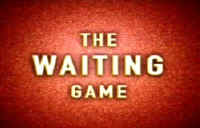
Synopsis
The Waiting Game: out of work actors put on dodgy Italian accents and be nice to customers in order to get as big a tip as possible in the bonus round.
It's also the name of BBC1s new <Bygraves> biiiig moooneeey </Bygraves> Saturday night quiz hosted by none-other than ex-Royal Shakespeare Company (who'd have guessed?) and professional American Ruby Wax, whose dial appears to be set to 'irritate' mode. However, she comes across as so over the top and overbearing and as such an exaggeration of her character that we can only wonder whether there's a hint of irony involved. UKGSP Towers are split as to whether she's funny or awful and it's fair to say that your opinion of her style is going to make or break whether you like the show or not.
 "Can't the camera just look at me for the half hour?"
"Can't the camera just look at me for the half hour?"We meet the teams through film that was shot the day before of Ruby interviewing each one in a The Weakest Link-style green room. A nice touch but ultimately pointless - why couldn't the interview take place in the studio?
 Let's all sit in a greenhouse - why not?
Let's all sit in a greenhouse - why not?Three couples answer questions for cash. One of each couple stands behind their industrial (it does have to be said) phallic-shaped buzzers, the other stands a few feet behind. The game is pretty much how we'd expected it - a question is read out and then a point-o-meter (represented by some electricity going through a coil for some reason) starts counting so that it's worth 1, 3, 5, 8, 12 and finally 15 points if you buzz in just within the ten seconds. The longer you wait to buzz, the more points a question is worth. The "cunning" twist is that you buzz but your partner answers - this would be more cunning if it hadn't been used before on Second Guess and even the BBC's own The Other Half.
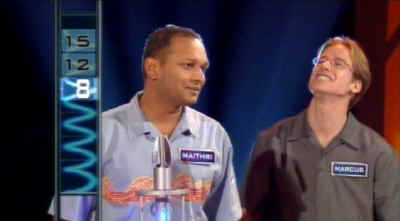 The "oh, I thought you knew that"-type hilarity
The "oh, I thought you knew that"-type hilarityBefore they answer though, Ruby interrogates both buzzer and buzzee (for want of a better word) in her own inimitable style. If buzzee does indeed know then they keep the points. If they don't, then the other couples win the points instead.
However, to add to the drama, if you get the last three questions wrong then the whole 15 points are given away. It's the Waiting Game's equivalent to "let's double the points!" These questions just about close the flaw of the game where you build a 4-point lead then jump in early for each question. This rule change does make it just about fair, because you don't have to go for the question if you really don't want to. It does seem that the best tactic in this circumstance is to sit tight and wait for another team to muck up, and you'll be through to the next round no problem. There's still something a mite unsatisfactory about this.
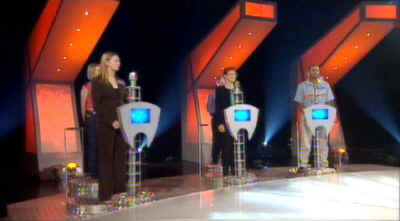 The contestants about to be crushed by a red-fingered giant. With three fingers.
The contestants about to be crushed by a red-fingered giant. With three fingers.Anyway, after eight questions, the lowest scoring couple are eliminated and have to 'do' the Walk of Shame. Round two is like round one but in the Every Second Counts stylee the partners swap places and there are only six questions with the last three carrying the weighty 15 point penalty for wrongdoers. The rightdoers get to go to the final where they could win up to £30,000. Woooh!
In good pop songs, the mantra is "GCSE chorus, A-Level verse". In this show, the fairly basic GSCE main game is vastly enhanced by one of the best end games we've seen for a very long time. The two players stand either side of a dividing wall and each has their own buzzer. After the round introduction is over, the dividing wall closes so that they can't see each other.
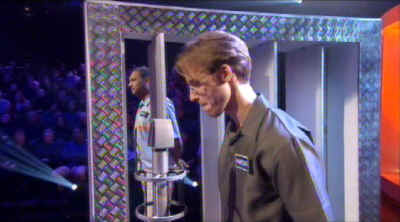 I've got some sun blinds like that.
I've got some sun blinds like that.To win the cash, they must get six questions correct within 60 seconds and, rather neatly, the clock runs down in hundredths of a second. It's just like Playing for Time... but better! When a question is read out like before the Electric Coil of Increasing Cash (our title) goes up the scale again starting at a pathetically small £10 between 0-1 seconds to a whopping £5,000 between 9 and 10 seconds.
If they answer six questions all in the £5000 range then they win £30,000. At any time, one of the team can buzz in, stop the cash clock and answer. If they're correct they get to add the cash to the bank. One of the team can also buzz in and 'pass', moving on to the next question. If nobody buzzes after 10 seconds then the time is wasted and the question is lost.
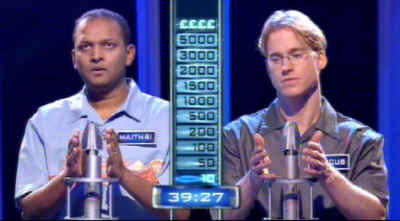 Time is money
Time is moneyThis end game is hilarious for various reasons. The first is mistiming: hitting the buzzer at 8.99 seconds potentially costs you £2000. The second is getting your wires crossed, such as buzzing in early and passing only to have your partner annoyed because he knew the answer and was just waiting for the cash to go up. Or there's letting the question go because you think your partner knows the answer and is going to buzz in... except he's thinking the same thing about you and nobody buzzes. Finally, there's the mad scramble at the end where they might have a few seconds thinking time left to guess several questions to obtain their quota. Remember, if they don't have six questions correct when they run out of waiting time then they leave with nothing. It's very good, we approve heartily.
 Ruby's chipmunk impression means they've won the cash.
Ruby's chipmunk impression means they've won the cash.The rounded-triangle set seems very similar to the one on Jet Set but has some nice touches. It's certainly better than other shows of it's ilk (Shafted, we're talking to you). The music is catchy too, and as such it seems criminally under-used during the show and particularly in the very sparse and alienating title sequence.
 The main game set
The main game setLike Winning Lines (this review probably holds the record for most cross-references), the end game elevates a basic, solid main game into something that's really rather watchable. Much of the show really does centre around how funny you find Ruby Wax's "look at me" routine. Paul Merton was due to host this show originally, and he may have had more general appeal to the public, but Ruby's machine-gun repartee probably fills in the acres of dead air better. Her handling of the introduction is a bit too disarming, but during the end game she's got it spot on.
Overall, not quite worth its weight in gold but definitely worth its wait in the schedules.
Inventor
Devised by the producer, Amanda Wilson.
Web links
Pictures
 Picture 1 - Ruby Wax.
Picture 1 - Ruby Wax.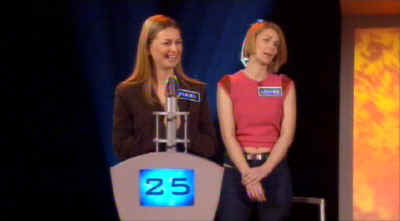 Picture 2 - Podium.
Picture 2 - Podium.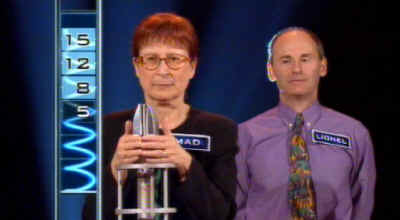 Picture 3 - The coil of cash in process.
Picture 3 - The coil of cash in process.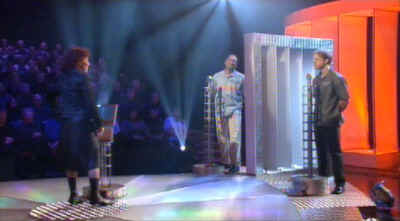 Picture 4 - The end game setup.
Picture 4 - The end game setup.
